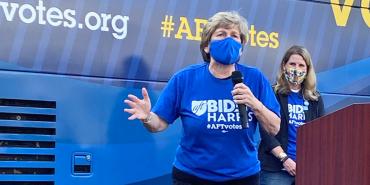Trampling on the sacred right to vote
Every person in America deserves a voice and representation in our democracy; these are essential for a vibrant society and for Americans to thrive. That is why voting is a sacred right in America, one that advocates have fought fiercely to expand, over the life of our republic, to Black Americans, women and others who have been left out. But in the last election, anti-democracy forces worked overtime to limit voting rights: purging eligible people from voter rolls, limiting who could vote by mail, reducing ballot drop-off locations, and closing polling places so that many voters had to wait in hours-long lines to cast ballots. This strategy was aggressive, coordinated and targeted—aimed at disenfranchising low-income, young and minority voters.
Despite these obstacles, the American people came out in record numbers in 2020 to vote—during a pandemic, no less. They chose a new president, defeating the incumbent by more than 7 million votes. But instead of celebrating this participation in our democracy, an alarming number of elected Republican leaders and conservative TV personalities cast doubt on the integrity of the presidential election, perpetuating the “big lie” that it was stolen. This baseless claim fueled the Jan. 6 attempted coup at the U.S. Capitol and is being used to suppress future voting and to disenfranchise lawful voters. According to the Brennan Center for Justice, as of Feb. 19, Republicans are pushing an astonishing 253 bills in 43 states to try to limit the right to vote. As Washington Post columnist Dana Milbank put it, “Democracy is working against Republicans—and so Republicans are working against democracy.”
Many of the most aggressive efforts to disenfranchise voters are in swing states where recent elections for national office were close. In Arizona, where Joe Biden won by more than 10,000 votes, Republicans in that state’s Legislature are trying to enact two dozen separate measures to make it harder for some residents to vote. One Arizona legislator behind these voter suppression efforts blatantly declared that “everybody shouldn’t be voting” and that “we have to look at the quality of votes.”
Similarly, in Georgia, where Biden won by nearly 12,000 votes and Democrats won the state’s two Senate runoff elections, the state Legislature recently introduced a raft of voter suppression measures. The Brennan Center has found that Georgia’s sweeping anti-voter bills would disproportionately hurt Black voters. One bill would severely scale back “souls to the polls,” the tradition in which Black voters cast their ballots after church on Sundays. Another would make it a misdemeanor to give food or water to people waiting to vote, which last year took some Georgians 11 hours.
Shamefully, the party of Lincoln has now become the party of voter suppression.
As President Lyndon B. Johnson said to a joint session of Congress when he introduced the Voting Rights Act 56 years ago this week, “It is wrong—deadly wrong—to deny any of your fellow Americans the right to vote.” His address came just eight days after Bloody Sunday, when John Lewis was brutally beaten with others marching for voting rights from Selma to Montgomery, Ala. As a result of much struggle and sacrifice, the Voting Rights Act of 1965 ultimately became law, correcting many injustices and removing many barriers to full enfranchisement.
But, as we see with current voter suppression legislation, even rights as sacrosanct as voting can be eroded. In the 2013 case Shelby County v. Holder, the U.S. Supreme Court invalidated a key part of the Voting Rights Act—the requirement that states with a history of discriminatory voting laws seek federal preclearance to pass new voting laws. Chief Justice John Roberts, writing for the court’s conservative majority, said the requirement was based on “eradicated practices.”
Of course, those practices had not been eradicated, and they are exploding anew. The Shelby decision created fertile ground for this new crop of voting restrictions, the likes of which we have not seen since the Jim Crow era.
The House of Representatives just passed a bill to counter these insidious efforts by restoring and expanding voting rights. The For the People Act, H.R. 1/S. 1, will strengthen our democracy by ending partisan gerrymandering in federal elections, banning voter roll purging, strengthening the government’s ethics laws and putting important restrictions on campaign finance regulations. This bill will help ensure that we the people—all of us—have access to the vote and therefore a voice in our democracy. The right to vote is essential to every other right, and it’s critical to our freedom to thrive. I urge the Senate to act swiftly to pass this once-in-a-generation legislation.

